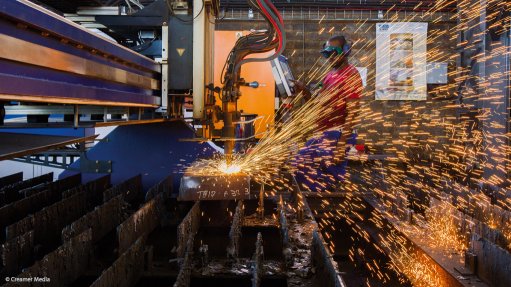
Photo by: Duane Daws
The International Trade Administration Commission of South Africa (Itac) confirms that it has recommended increased protection on several downstream steel products and that it is also considering recommending duties on a range of other value-added steel products in future.
In addition, the commission has told Engineering News Online that investigations into extending safeguard protection on two primary-steel product categories are in the “final stages”.
Trade and Industry Minister Dr Rob Davies reported recently that he had signed off on the duties on downstream steel products as part of a “whole-value-chain approach” to supporting the domestic steel industry, which was being rocked by cheap imports as a result of a “global glut” of steel.
Itac recommended that tariffs be increased on welded link chains, grinding media balls, fasteners and certain wire products to bound rates allowed for under South Africa’s commitments to the World Trade Organisation.
For welded link chains and grinding media balls protection is being increased from 0% to 15%, while duties on certain wire products will rise from free of duty to 10%. The duties applicable to fasteners would rise from between 0% and 20%, to between 10% and 30%.
Further tariffs are being considered for other downstream products including roofing products, tubes and pipes, appliances, prefabricated buildings and stranded wire, as well as ropes cables and gabion wire netting.
In all cases, ordinary customs duties to the WTO bound rate, not safeguard duties, are being considered.
However, Itac communications manager Thalukanyo Nangammbi confirms that the investigations into the introduction of safeguard duties for hot-rolled coil (HRC) and cold-rolled coil (CRC) are in the final stages.
Comments on essential facts of the HRC investigation being considered by the commission were received from the interested parties and the applicant, ArcelorMittal South Africa. “The next stage is for the commission to make a final determination and forward the recommendations to the Minister of Trade and Industry,” Nangammbi explains.
The CRC investigation, meanwhile, is at the final stage before essential-facts letters.
Davies stresses that government is aware that downstream industries, and not only the primary sector, are under pressure from cheap imports.
However, he says government will not countenance the closure of what remains of the domestic upstream sector, despite objections raised to further primary-steel protection by some downstream manufacturers. The closure of steel production will not only be “disruptive”, but also a “stupid choice for an iron-ore country that is seeking to beneficiate”.
“Even if we made a choice . . . to let primary-steel manufacturing go, we don’t have the capacity in our ports to import the volumes of steel that would be required for the downstream. So it would be a stupid choice to let primary-steel manufacturing go.”
Davies says government has, instead, adopted a “whole value-chain approach so that we reduce the number of conflicts that there are between upstream and downstream”.